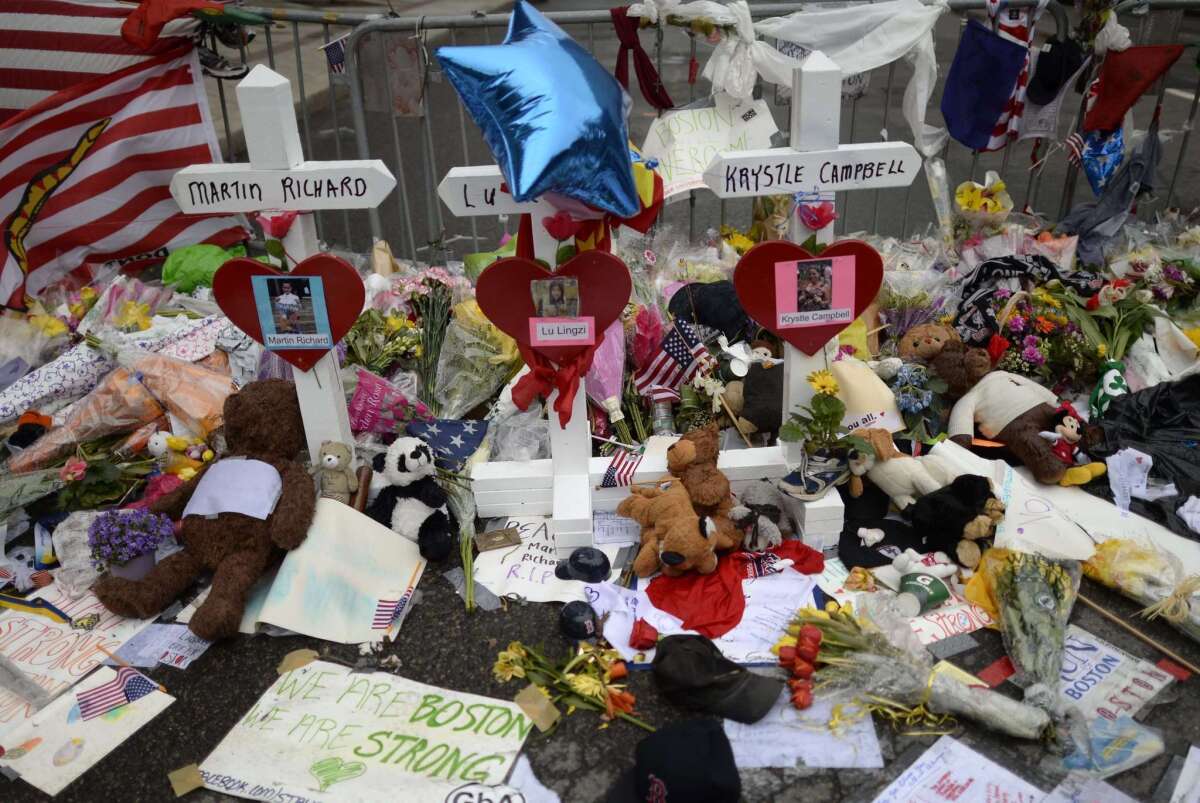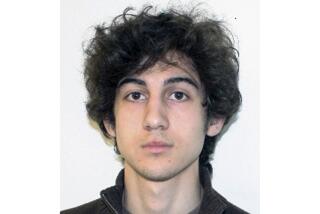Opinion: How the deck was stacked against Boston bomber Dzhokhar Tsarnaev

In this April 20, 2013, photo, mememtos and crosses decorate a makeshift memorial on Boylston Street, near the scene of
- Share via
On first blush, it seems remarkable: a jury in Massachusetts, a blue-state bastion that doesn’t allow the death penalty for state offenses, sentenced Dzhokhar Tsarnaev to die for his role in the lethal Boston Marathon bombings.
After all, Tsarnaev’s attorneys had given the jury a plausible reason to keep him off death row. He was a good teenager gone bad under the influence of his jihad-crazed older brother, whom he idolized. The parents of one of Tsarnaev’s victims, an 8-year-old boy named Martin Richard, provided another reason: a death sentence would lead to appeals that keep Tsarnaev’s name and face in the news for years, providing a constant, painful reminder to his victims.
But the deck was stacked against Tsarnaev in at least three ways, one of which was entirely his own fault.
Let’s start with the latter: The crime was heinous, and the deaths were inflicted in a way that shocks the conscience. Not that murder is ever easy to stomach, but Tsarnaev and his brother loaded their bombs with nails and pellets that literally ripped through flesh and bone. And Tsarnaev placed one of those bombs himself, seeing the men, women and children it would surely maim or kill.
As some readers have commented, if there was any crime that cried out for the death penalty, this was it.
But as The Times’ editorial board has argued, a principled stance against the death penalty means opposing it in every instance. “The jury should reject capital punishment and sentence Tsarnaev to life in prison without possibility of parole because that is how a mature society acts,” the board wrote in April. “Not out of vengeance. Not out of passion. Killing another human being is immoral, whether by bomb or by lethal injection.”
That’s why the other two deck-stacking factors are important.
The first is that no potential juror was allowed to serve unless he or she supported the death penalty. That’s an unavoidable requirement; allowing those who oppose the death penalty to serve on such juries would guarantee that the penalty could never be imposed. I don’t see how you get around that. Yet the restriction nevertheless tilts the pool, effectively putting Tsarnaev’s fate in the hands of people who didn’t reflect the broader Massachusetts public’s reluctance to sentence people to death.
The second is the decision to hold the trial in Boston. Tsarnaev’s attack wasn’t just on a group of people, but on a beloved local institution. That’s not to say juries in other parts of the country wouldn’t have imposed the death penalty; considering the crime, the chances of life imprisonment were slim regardless. But at least a jury in Connecticut or Vermont would have been less susceptible to the emotional tug the bombing had on Bostonians.
I’m not suggesting we should feel sorry for Tsarnaev, who showed little or no sorrow in court for his victims. He made his own bed on this one. Instead, I feel sorry for us as a society. The death penalty doesn’t make us safer or stronger. It just makes the inmate population smaller.
------------
FOR THE RECORD
An earlier version of this post said that Tsarnaev showed little or no sorrow “on the stand” for his victims. He was in court throughout the trial and sentencing phase but did not testify.
------------
Follow Healey’s intermittent Twitter feed: @jcahealey
More to Read
A cure for the common opinion
Get thought-provoking perspectives with our weekly newsletter.
You may occasionally receive promotional content from the Los Angeles Times.











